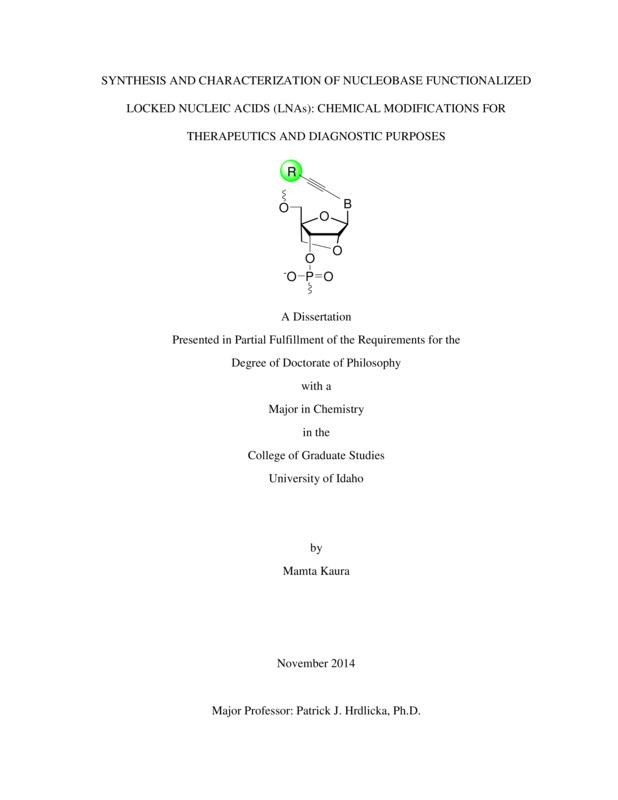Synthesis and Characterization of Nucleobase Functionalized Locked Nucleic Acids (LNAs); Chemical Modifications for therapeutic and diagnostic purposes.
Kaura, Mamta. (2014). Synthesis and Characterization of Nucleobase Functionalized Locked Nucleic Acids (LNAs); Chemical Modifications for therapeutic and diagnostic purposes.. Theses and Dissertations Collection, University of Idaho Library Digital Collections. https://www.lib.uidaho.edu/digital/etd/items/kaura_idaho_0089e_10448.html
- Title:
- Synthesis and Characterization of Nucleobase Functionalized Locked Nucleic Acids (LNAs); Chemical Modifications for therapeutic and diagnostic purposes.
- Author:
- Kaura, Mamta
- Date:
- 2014
- Program:
- Chemistry
- Subject Category:
- Chemistry
- Abstract:
-
DNA is the genetic code of life, containing vital information required for the existence of life. An understanding of the structure of DNA, its function and Watson-Crick hybridization led to the conceptualization of the antisense strategy. The concept suggested that it is possible to design drugs that target disease-related mRNA (messenger RNA) antisense oligonucleotides (ASO) that bind to the target based on Watson-Crick hybridization rules and prevent its translation into proteins. Since, copy of target RNA present in a cell is much smaller in comparison to proteins, i.e., the most common drug target for small molecue drugs, theoretically allows for low concentrations of the antisense drug to be used as compared to conventional drugs. The simplicity of this concept has led to the use of ASO drugs as therapeutic agents. The use of conformationally restricted nucleotides as antisense modifications has led to an impressive progress in the field of oligonucleotide therapeutics. In particular, Locked Nucleic Acids (LNAs) have been outlined as a very promising antisense modification due to their unparalleled hybridization properties. Thus, LNA has become the focus of multiple research groups and pharmaceutical companies, leading to the development of LNA modified ON candidates.
During my Ph.D. work, I developed numerous chemically modified LNA building blocks by using nucleobase functionalization strategy to modulate the biophysical properties of respective building block. We conducted studies on different nucleobases (cytosine and adenosine) where we have shown that LNA building blocks, which are modified at the C5 position of cytosine pyrimidines and C8 position of adenine purines. We also studied the properties of C5 LNA (U) monomers conjugated to bulky hydrophilic carbohydrates substituents. The goal of the study was to develop nucleotides that confer stability towards exonuclease enzymes without disrupting the duplex stability as hydrophobic substituents.
Chemically modified oligonucleotides are finding an increasing use in diagnostics as fluorescent hybridization probes to detect DNA mutations and to study DNA-protein interactions. We have developed DNA probes centrally modified with 5-[3-(1-pyrenecarboxamido) propynyl] DNA monomer, which are flanked with conventional LNAs as diagnostic probes for detection of single nucleotide polymorphism in DNA. These neighbouring LNAs influence the position of the fluorophore in a similar manner as for the C5-fluorophore functionalized LNA probes. These probes are relatively easier to synthesize and results in greater fluorescence based discrimination of matched vs mismatched duplexes than just C5-LNA or C5-DNA fluorophore functionalized probes.
These studies conducted on Locked Nucleic Acids (LNAs) suggested, that, i) nucleobase functionalization improves the therapeutic properties of LNA; ii) introduction of canonical LNAs in an ON sequence can be used to develop diagnostic probes with improved photophysical properties.
- Description:
- doctoral, Ph.D., Chemistry -- University of Idaho - College of Graduate Studies, 2014
- Major Professor:
- Hrdlicka, Patrick Jerzey
- Committee:
- Williams, Richard; Edwards, W.; McIlroy, David
- Defense Date:
- 2014
- Identifier:
- Kaura_idaho_0089E_10448
- Type:
- Text
- Format Original:
- Format:
- application/pdf
- Rights:
- In Copyright - Educational Use Permitted. For more information, please contact University of Idaho Library Special Collections and Archives Department at libspec@uidaho.edu.
- Standardized Rights:
- http://rightsstatements.org/vocab/InC-EDU/1.0/

